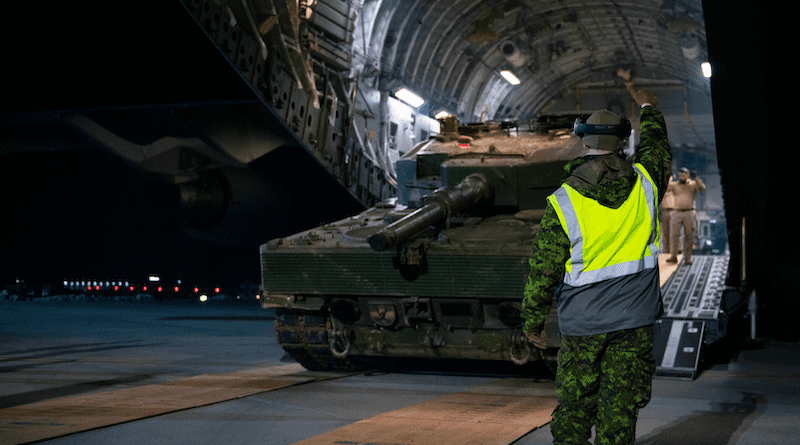Ukraine Sends Mixed Messages Over Defense Ministry At A Sensitive Point In The War
By RFE RL
(RFE/RL) — Intense fighting in eastern Ukraine between Russian and Ukrainian troops continues as Kyiv sends mixed signals over a possible reshuffle at the Defense Ministry amid expectations of a major Russian offensive in the coming weeks.
Almost a year into the conflict, sparked by Russia’s invasion of Ukraine late last February, a battle for the city of Bakhmut rages, as well as in areas around it, such as the towns of Soledar and Vuhledar.
“The battles for the region are heating up,” according to Donetsk Governor Pavlo Kyrylenko, who said “the Russians are throwing new units into the battle and eradicating our towns and villages.”
Meanwhile, Russian shelling had subsided in the neighboring Luhansk region because “the Russians have been saving ammunition for a large-scale offensive,” Luhansk Governor Serhiy Hayday claimed.
Amid the tense fighting that President Volodymyr Zelenskiy characterized late on February 5 as “very difficult,” Ukraine announced that Defense Minister Oleksiy Reznikov would be transferred to the post of minister for strategic industries to strengthen military-industrial cooperation and would be replaced by General Kyrylo Budanov, the head of the country’s military intelligence agency.
However, less than 24 hours later, David Arakhamia, the head of Zelenskiy’s parliamentary bloc, reversed his earlier comments, saying on Telegram that “there will be no personnel changes in the defense sector this week.”
Reznikov has said that while he was not planning to resign, any decision about his future would be made by the president.
Rumors of a possible Reznikov resignation or ouster have mounted after a series of accusations of corruption within the ministry.
In January, Ukrainian media reported that the Defense Ministry had allegedly purchased products for the military at inflated prices through a “gasket” company. Other charges of corruption were also alleged in the media.
Deputy Defense Minister Vyacheslav Shapovalov, who was responsible for supplying troops with food and equipment, resigned on January 24, citing the accusations, which he said were baseless.
Ukrainian authorities also again accused Russian forces of firing at targets across the Dnieper River from the Russia-occupied Zaporizhzhya nuclear power plant. The attacks damaged residential buildings and electricity lines in Nikopol and Marhanets.
The reports come as Russia’s deputy foreign minister, Sergei Ryabkov, said International Atomic Energy Agency (IAEA) chief Rafael Grossi is expected to visit Moscow this week for talks on creating a safety zone around the Zaporizhzhya plant, Europe’s largest nuclear power station.
Kremlin spokesman Dmitry Peskov confirmed Grossi’s visit but said the IAEA chief would meet officials from the state nuclear energy firm Rosatom and the Foreign Ministry but not from the Kremlin itself.
Meanwhile, Ukrainian officials continue to warn that Russia is planning a new, full-scale offensive as early as mid-February. Russia has been deploying “more and more reserves” and equipment in eastern Ukraine, Hayday said.
Ukraine, too, has been planning its own counteroffensive, but that depends on the supplies of battle tanks and infantry fighting vehicles Western countries have pledged to send to Kyiv.
Canadian Defense Minister Anita Anand tweeted late on February 5 that the first Leopard tank her country is donating to Ukraine had arrived in Poland. Training for Ukrainian personnel in how to use the tank was due to begin soon, she added.
Ukraine’s Western allies pledged to send dozens of German-made Leopard tanks and other weaponry to Ukraine to help it defeat the invading Russian forces.
In Kyiv, Reznikov renewed calls for allies to supply additional weapons, including jet fighters, saying the West’s reluctance to send such aircraft will “cost us more lives” in its battle against Russian forces.
Western leaders have said it was not practical to send such jets to Ukraine given the amount of time it would take to train pilots and maintenance crews and amid fears of a widening of the conflict.
UN Secretary-General Antonio Guterres warned in a speech on February 6 to the UN General Assembly that he fears the likelihood of further escalation in the conflict means the world is heading toward a “wider war.”
“The prospects for peace keep diminishing. The chances of further escalation and bloodshed keep growing,” he told diplomats in New York. “I fear the world is not sleepwalking into a wider war. I fear it is doing so with its eyes wide open.”

